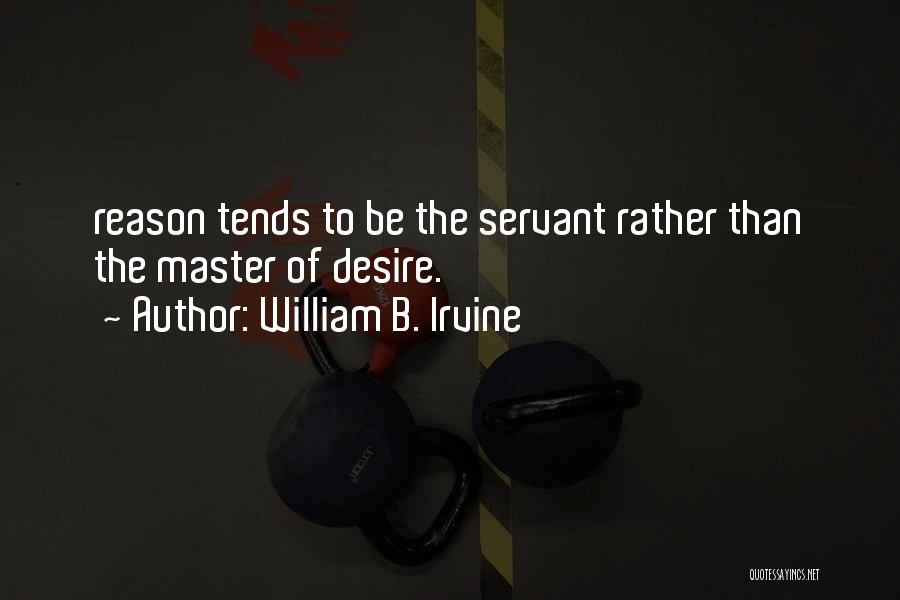William B. Irvine Quotes & Sayings
Enjoy the top 42 famous quotes, sayings and quotations by William B. Irvine.
Famous Quotes By William B. Irvine
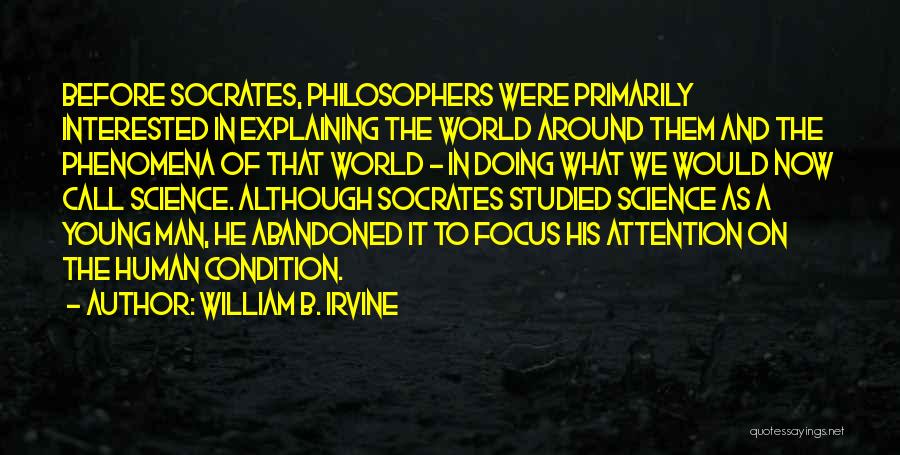
Before Socrates, philosophers were primarily interested in explaining the world around them and the phenomena of that world - in doing what we would now call science. Although Socrates studied science as a young man, he abandoned it to focus his attention on the human condition. — William B. Irvine
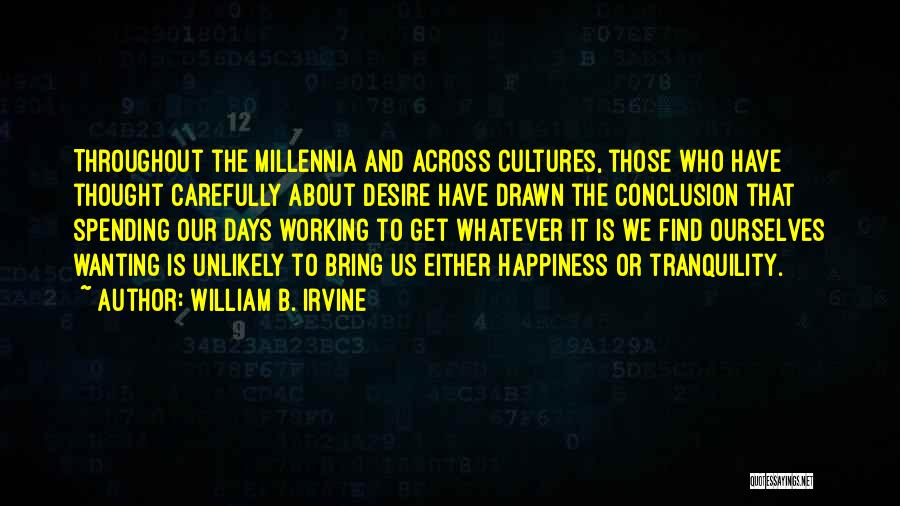
Throughout the millennia and across cultures, those who have thought carefully about desire have drawn the conclusion that spending our days working to get whatever it is we find ourselves wanting is unlikely to bring us either happiness or tranquility. — William B. Irvine
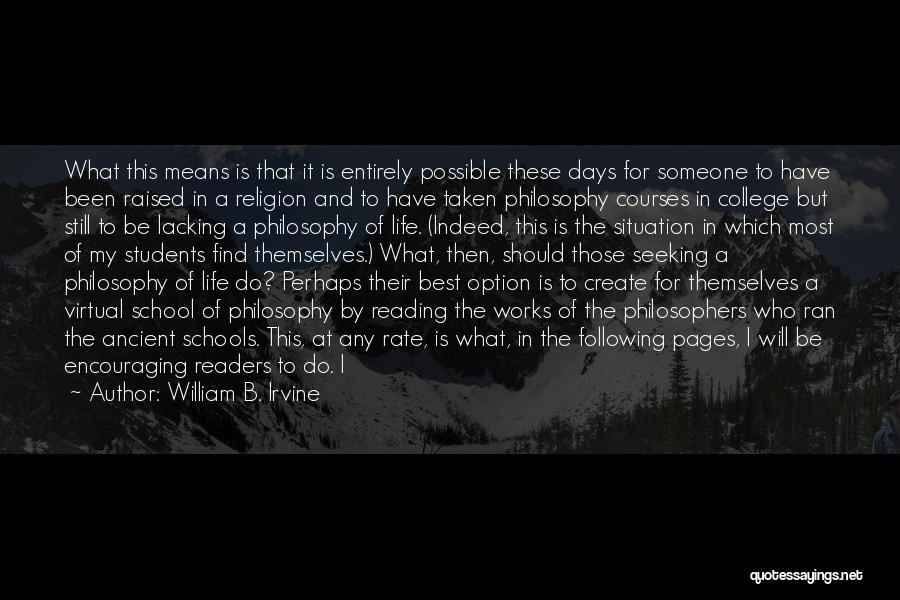
What this means is that it is entirely possible these days for someone to have been raised in a religion and to have taken philosophy courses in college but still to be lacking a philosophy of life. (Indeed, this is the situation in which most of my students find themselves.) What, then, should those seeking a philosophy of life do? Perhaps their best option is to create for themselves a virtual school of philosophy by reading the works of the philosophers who ran the ancient schools. This, at any rate, is what, in the following pages, I will be encouraging readers to do. I — William B. Irvine
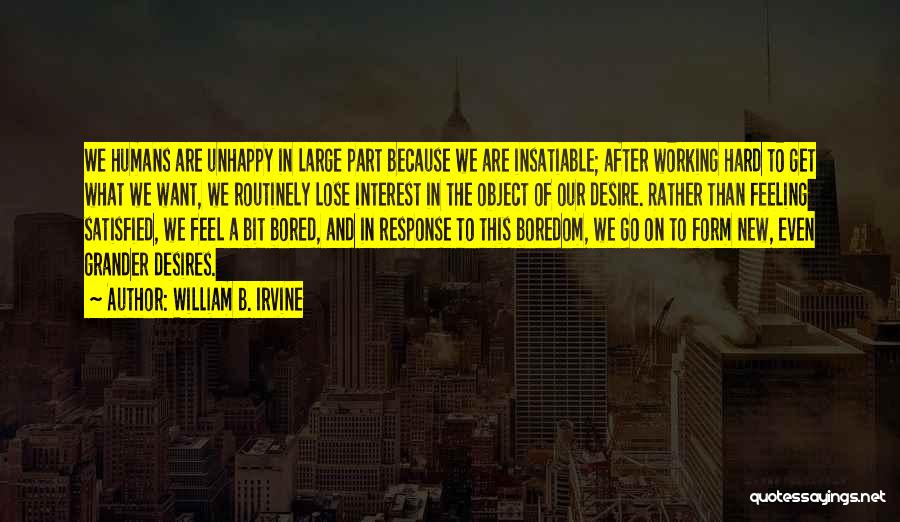
We humans are unhappy in large part because we are insatiable; after working hard to get what we want, we routinely lose interest in the object of our desire. Rather than feeling satisfied, we feel a bit bored, and in response to this boredom, we go on to form new, even grander desires. — William B. Irvine
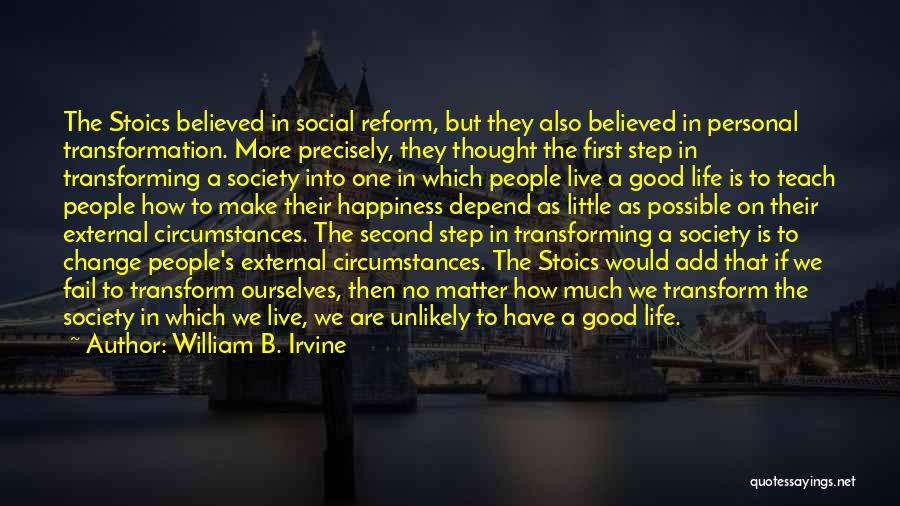
The Stoics believed in social reform, but they also believed in personal transformation. More precisely, they thought the first step in transforming a society into one in which people live a good life is to teach people how to make their happiness depend as little as possible on their external circumstances. The second step in transforming a society is to change people's external circumstances. The Stoics would add that if we fail to transform ourselves, then no matter how much we transform the society in which we live, we are unlikely to have a good life. — William B. Irvine
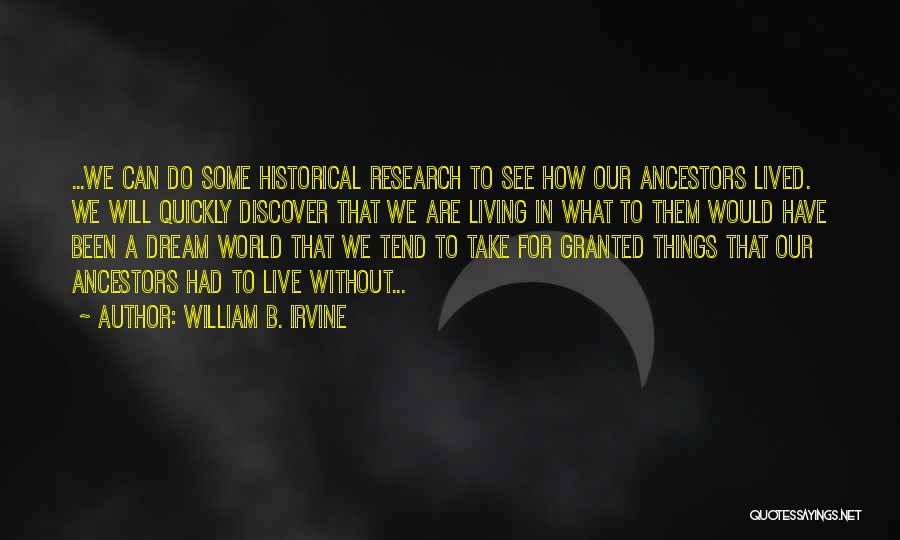
...we can do some historical research to see how our ancestors lived. We will quickly discover that we are living in what to them would have been a dream world that we tend to take for granted things that our ancestors had to live without... — William B. Irvine
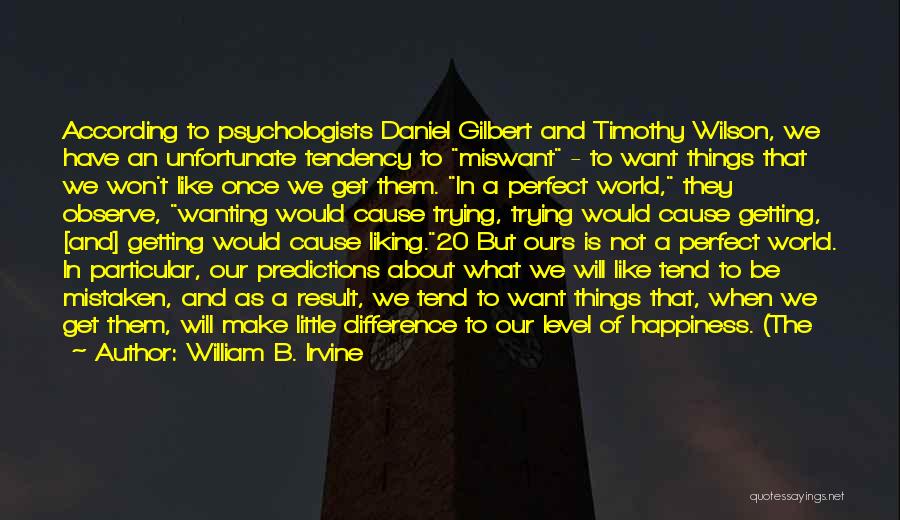
According to psychologists Daniel Gilbert and Timothy Wilson, we have an unfortunate tendency to "miswant" - to want things that we won't like once we get them. "In a perfect world," they observe, "wanting would cause trying, trying would cause getting, [and] getting would cause liking."20 But ours is not a perfect world. In particular, our predictions about what we will like tend to be mistaken, and as a result, we tend to want things that, when we get them, will make little difference to our level of happiness. (The — William B. Irvine

It is, after all, hard to know what to choose when you aren't really sure what you want. — William B. Irvine
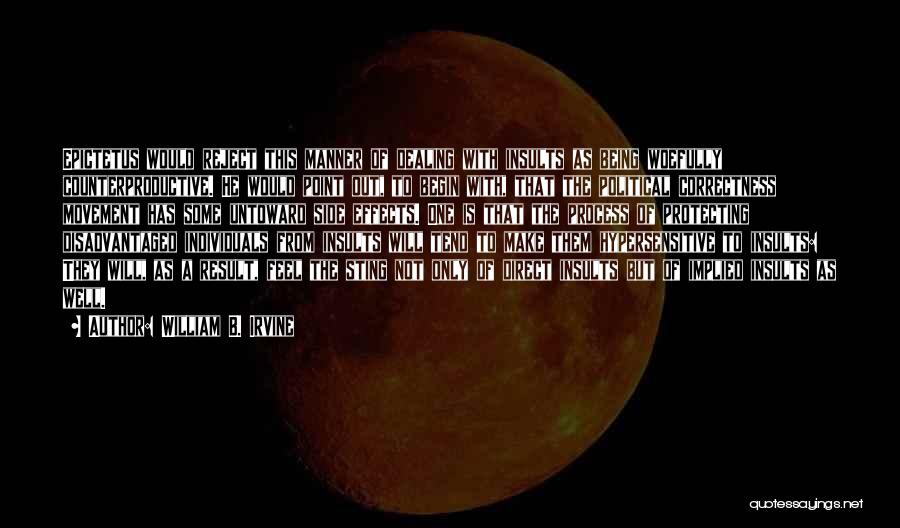
Epictetus would reject this manner of dealing with insults as being woefully counterproductive. He would point out, to begin with, that the political correctness movement has some untoward side effects. One is that the process of protecting disadvantaged individuals from insults will tend to make them hypersensitive to insults: They will, as a result, feel the sting not only of direct insults but of implied insults as well. — William B. Irvine
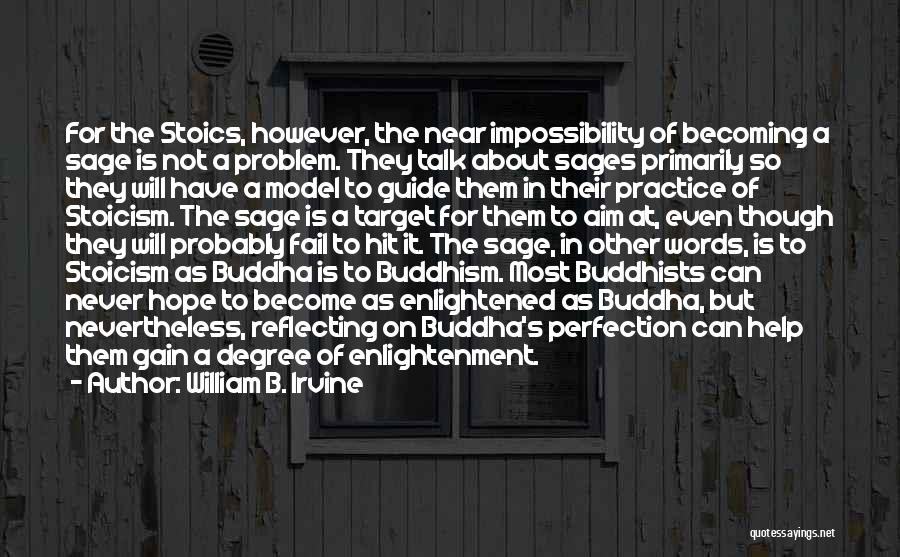
For the Stoics, however, the near impossibility of becoming a sage is not a problem. They talk about sages primarily so they will have a model to guide them in their practice of Stoicism. The sage is a target for them to aim at, even though they will probably fail to hit it. The sage, in other words, is to Stoicism as Buddha is to Buddhism. Most Buddhists can never hope to become as enlightened as Buddha, but nevertheless, reflecting on Buddha's perfection can help them gain a degree of enlightenment. — William B. Irvine
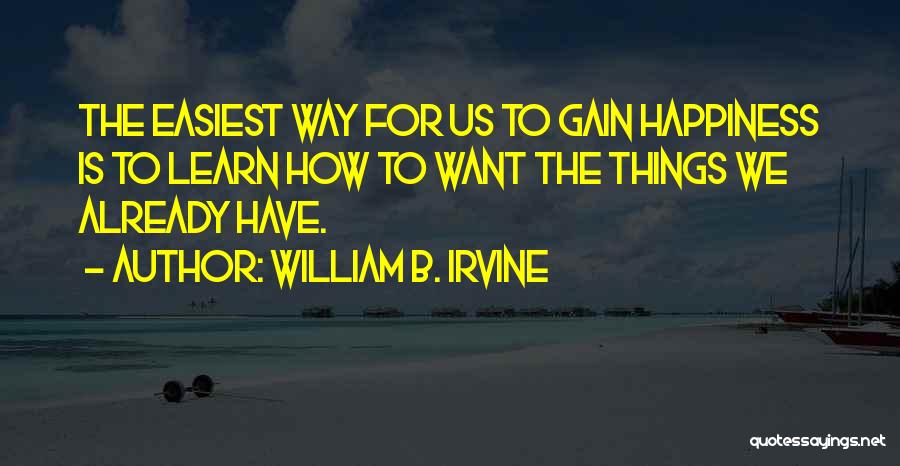
the easiest way for us to gain happiness is to learn how to want the things we already have. — William B. Irvine
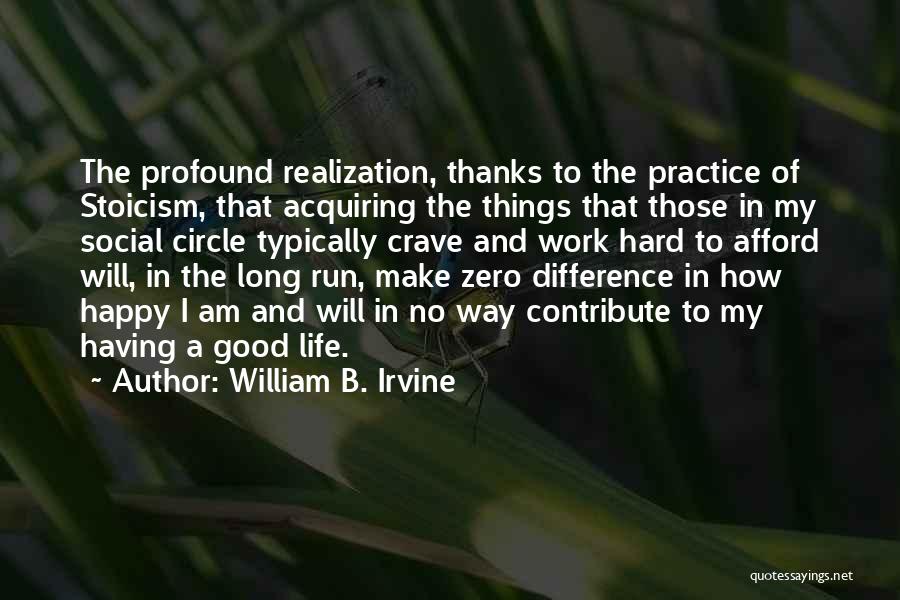
The profound realization, thanks to the practice of Stoicism, that acquiring the things that those in my social circle typically crave and work hard to afford will, in the long run, make zero difference in how happy I am and will in no way contribute to my having a good life. — William B. Irvine
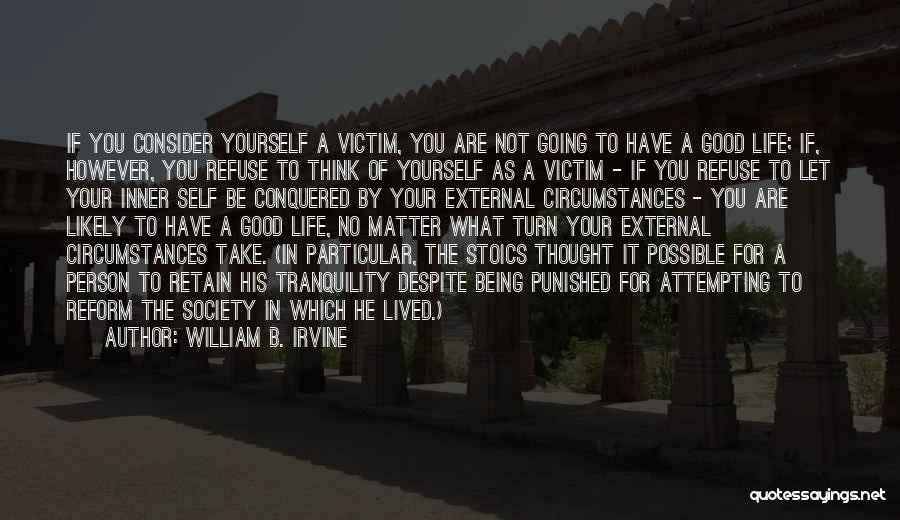
If you consider yourself a victim, you are not going to have a good life; if, however, you refuse to think of yourself as a victim - if you refuse to let your inner self be conquered by your external circumstances - you are likely to have a good life, no matter what turn your external circumstances take. (In particular, the Stoics thought it possible for a person to retain his tranquility despite being punished for attempting to reform the society in which he lived.) — William B. Irvine
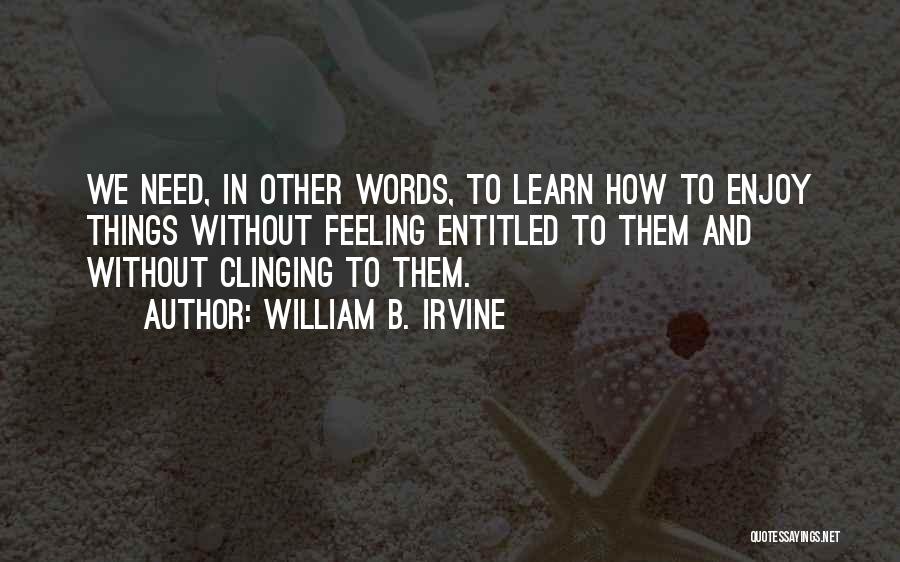
We need, in other words, to learn how to enjoy things without feeling entitled to them and without clinging to them. — William B. Irvine
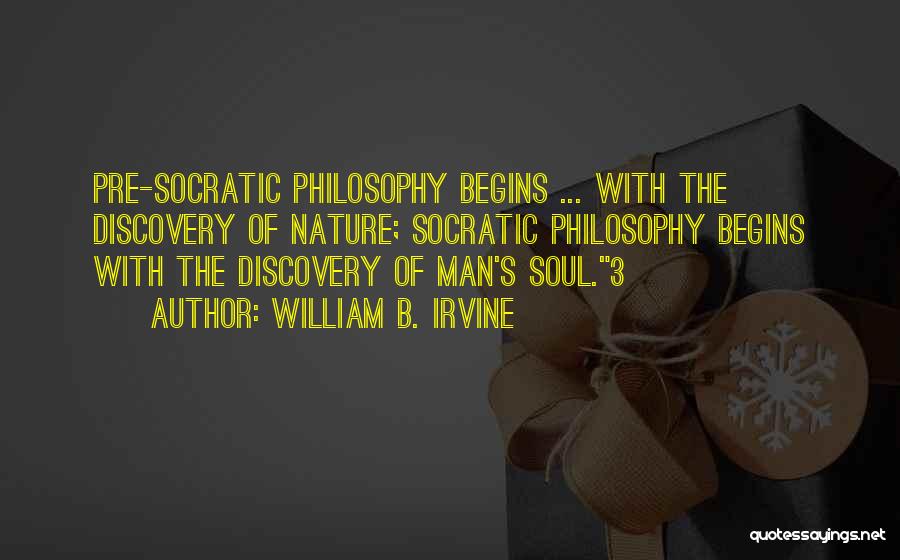
Pre-Socratic philosophy begins ... with the discovery of Nature; Socratic philosophy begins with the discovery of man's soul."3 — William B. Irvine
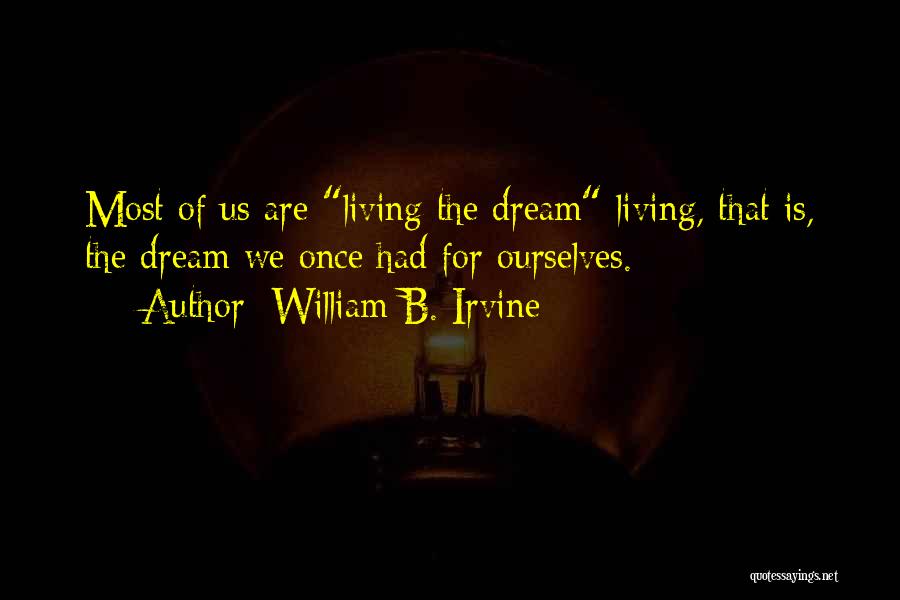
Most of us are "living the dream" living, that is, the dream we once had for ourselves. — William B. Irvine
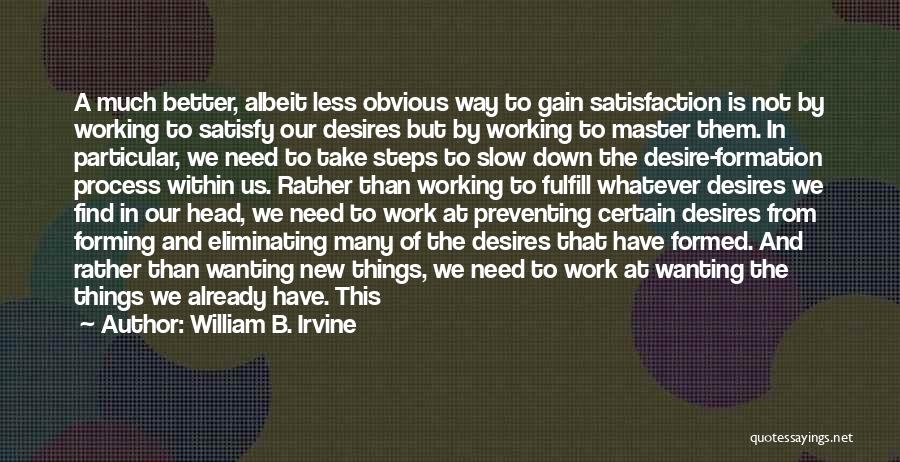
A much better, albeit less obvious way to gain satisfaction is not by working to satisfy our desires but by working to master them. In particular, we need to take steps to slow down the desire-formation process within us. Rather than working to fulfill whatever desires we find in our head, we need to work at preventing certain desires from forming and eliminating many of the desires that have formed. And rather than wanting new things, we need to work at wanting the things we already have. This — William B. Irvine
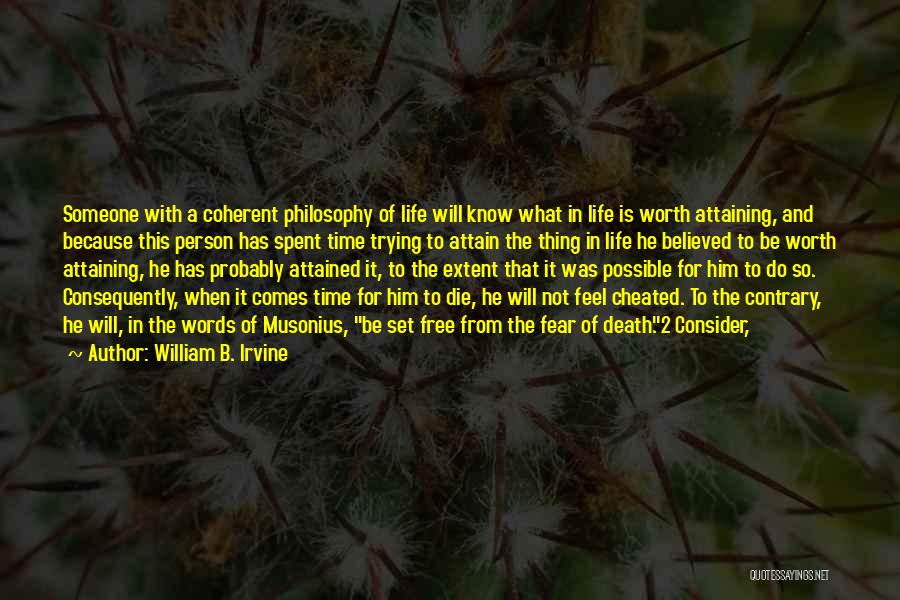
Someone with a coherent philosophy of life will know what in life is worth attaining, and because this person has spent time trying to attain the thing in life he believed to be worth attaining, he has probably attained it, to the extent that it was possible for him to do so. Consequently, when it comes time for him to die, he will not feel cheated. To the contrary, he will, in the words of Musonius, "be set free from the fear of death."2 Consider, — William B. Irvine
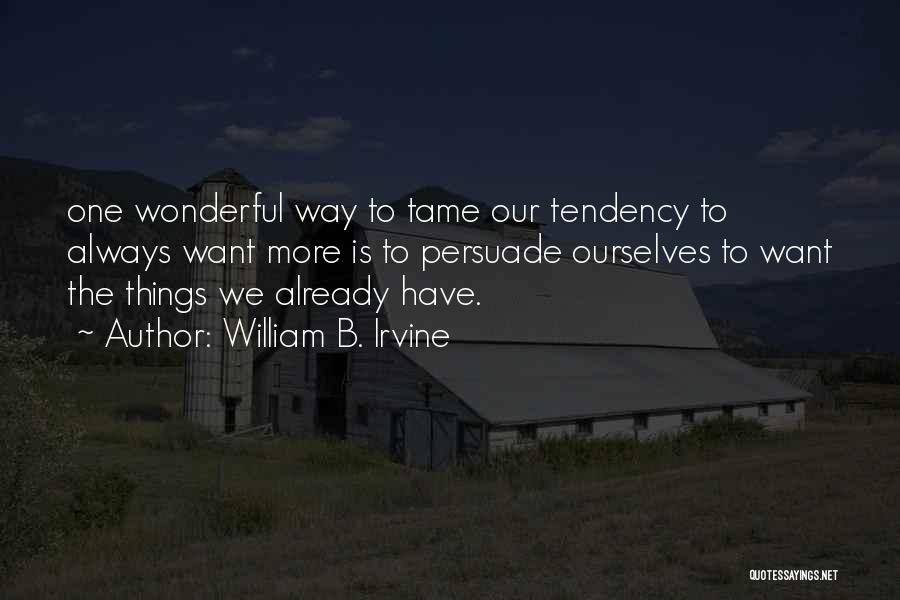
one wonderful way to tame our tendency to always want more is to persuade ourselves to want the things we already have. — William B. Irvine
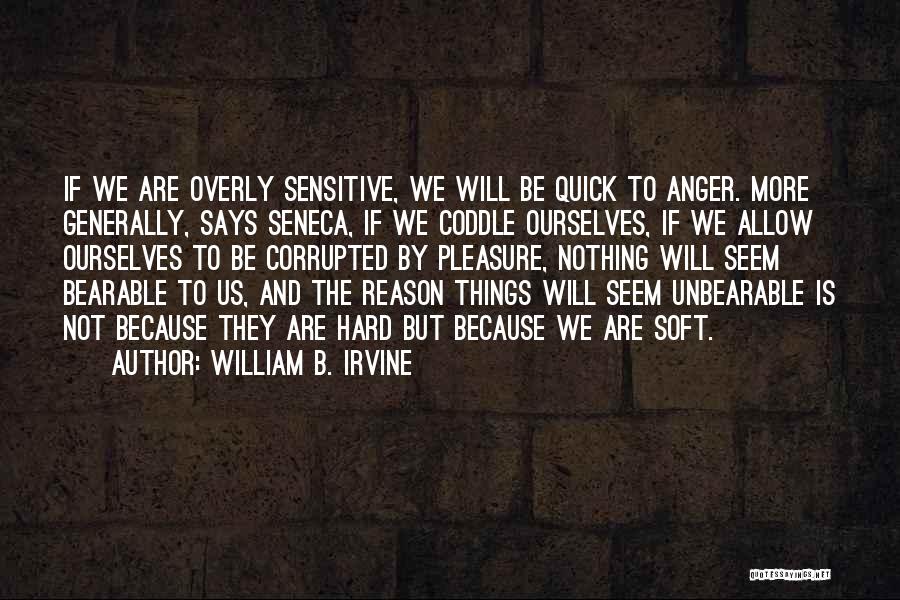
If we are overly sensitive, we will be quick to anger. More generally, says Seneca, if we coddle ourselves, if we allow ourselves to be corrupted by pleasure, nothing will seem bearable to us, and the reason things will seem unbearable is not because they are hard but because we are soft. — William B. Irvine
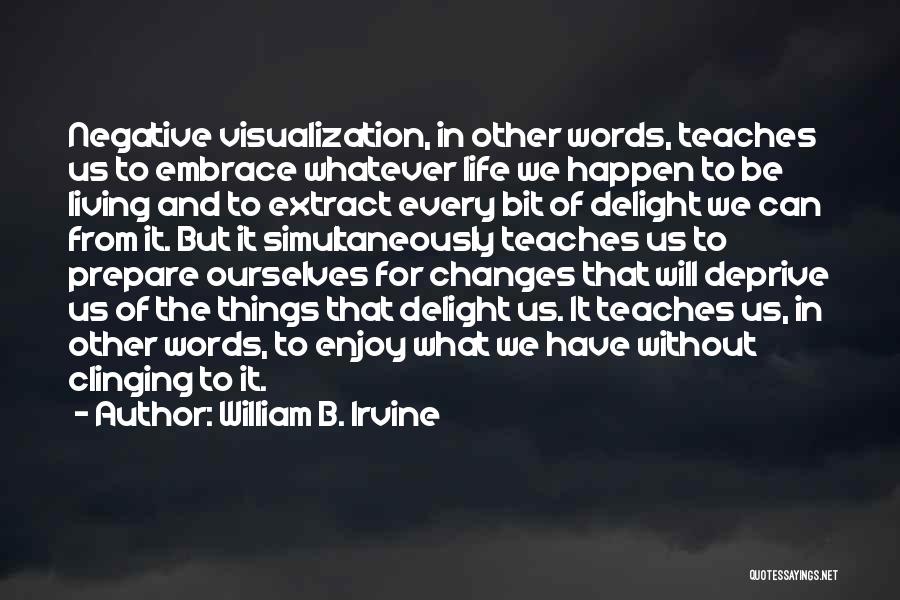
Negative visualization, in other words, teaches us to embrace whatever life we happen to be living and to extract every bit of delight we can from it. But it simultaneously teaches us to prepare ourselves for changes that will deprive us of the things that delight us. It teaches us, in other words, to enjoy what we have without clinging to it. — William B. Irvine

Your primary desire, says Epictetus, should be your desire not to be frustrated by forming desires you won't be able to fulfill. — William B. Irvine
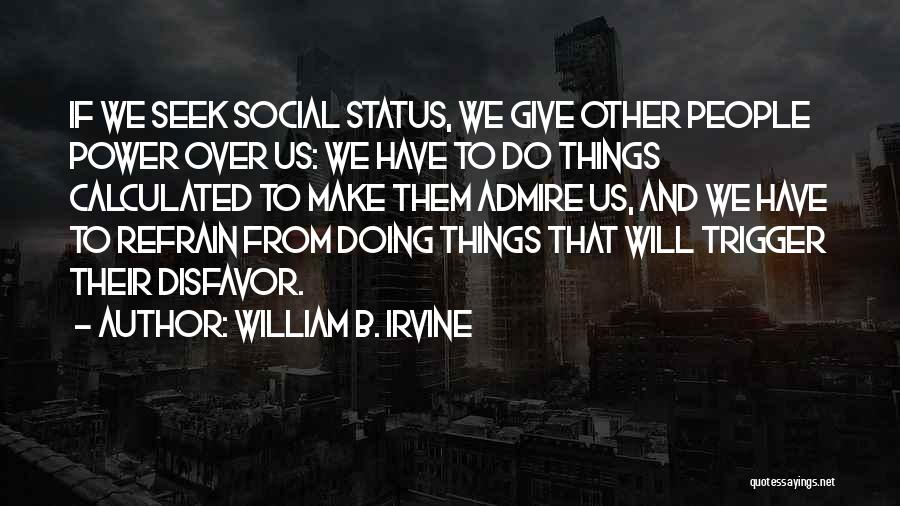
if we seek social status, we give other people power over us: We have to do things calculated to make them admire us, and we have to refrain from doing things that will trigger their disfavor. — William B. Irvine

He believed hunger to be the best appetizer, and because he waited until he was hungry or thirsty before he ate or drank, "he used to partake of a barley cake with greater pleasure than others did of the costliest of foods, and enjoyed a drink from a stream of running water more than others did their Thasian wine."6 When asked about his lack of an abode, Diogenes would reply that he had access to the greatest houses in every city - to their temples and gymnasia, that is. And when asked what he had learned from philosophy, Diogenes replied, "To be prepared for every fortune."7 This reply, as we shall see, anticipates one important theme of Stoicism. The — William B. Irvine
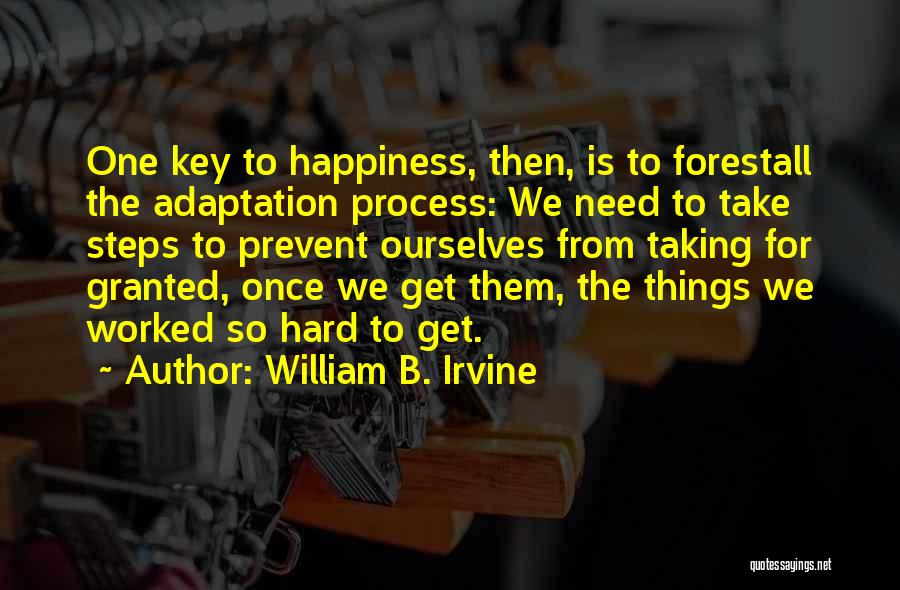
One key to happiness, then, is to forestall the adaptation process: We need to take steps to prevent ourselves from taking for granted, once we get them, the things we worked so hard to get. — William B. Irvine
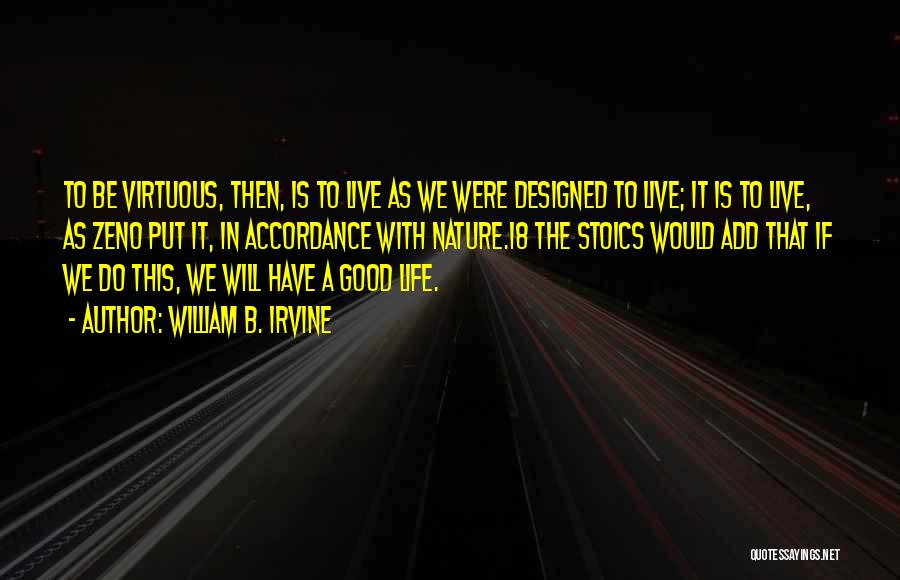
To be virtuous, then, is to live as we were designed to live; it is to live, as Zeno put it, in accordance with nature.18 The Stoics would add that if we do this, we will have a good life. — William B. Irvine
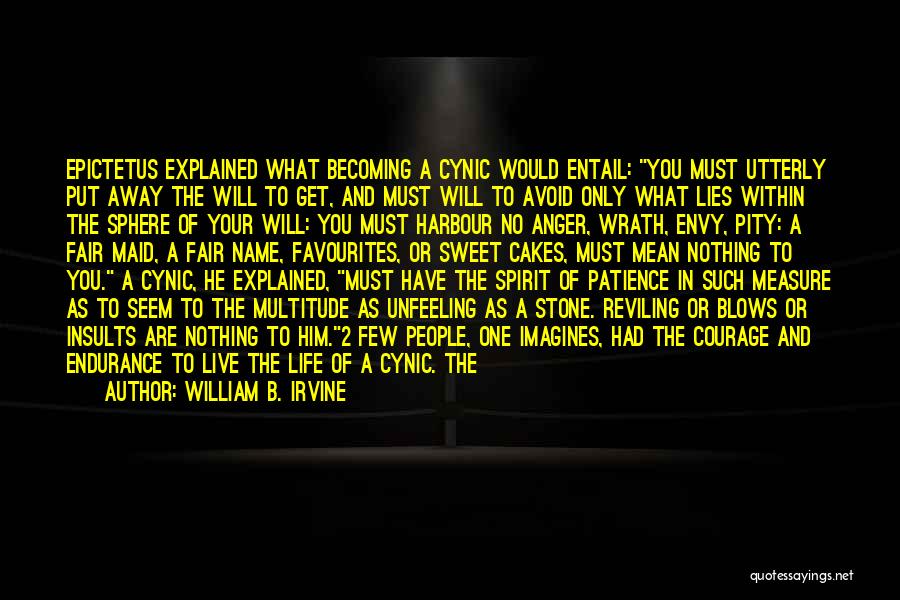
Epictetus explained what becoming a Cynic would entail: "You must utterly put away the will to get, and must will to avoid only what lies within the sphere of your will: you must harbour no anger, wrath, envy, pity: a fair maid, a fair name, favourites, or sweet cakes, must mean nothing to you." A Cynic, he explained, "must have the spirit of patience in such measure as to seem to the multitude as unfeeling as a stone. Reviling or blows or insults are nothing to him."2 Few people, one imagines, had the courage and endurance to live the life of a Cynic. The — William B. Irvine
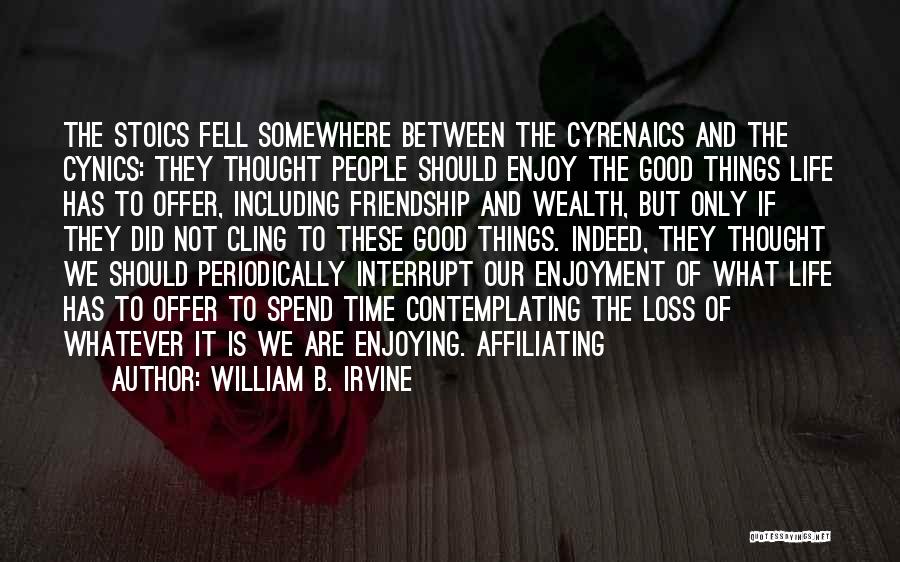
The Stoics fell somewhere between the Cyrenaics and the Cynics: They thought people should enjoy the good things life has to offer, including friendship and wealth, but only if they did not cling to these good things. Indeed, they thought we should periodically interrupt our enjoyment of what life has to offer to spend time contemplating the loss of whatever it is we are enjoying. Affiliating — William B. Irvine

Stoicism, understood properly, is a cure for a disease. The disease in question is the anxiety, grief, fear, and various other negative emotions that plague humans and prevent them from experiencing a joyful existence. — William B. Irvine
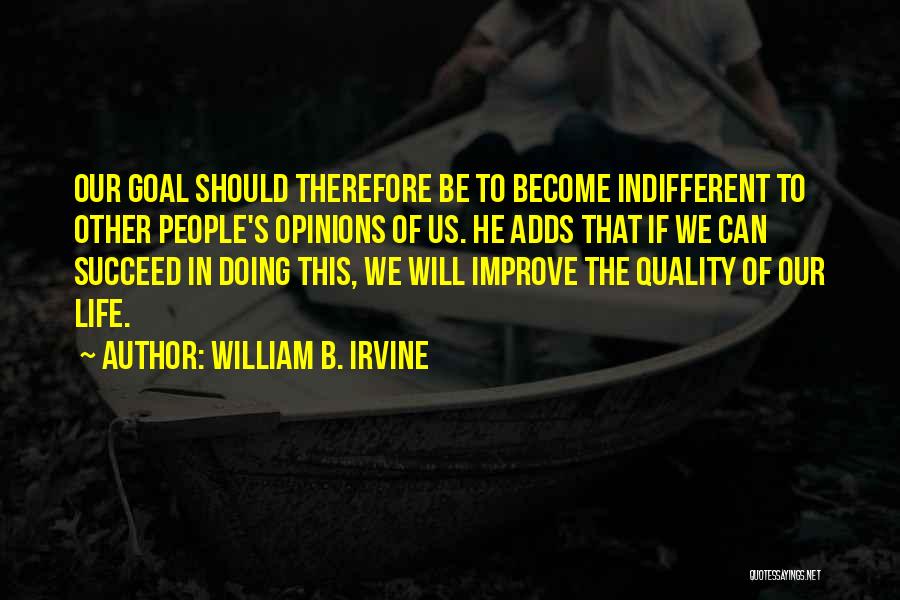
Our goal should therefore be to become indifferent to other people's opinions of us. He adds that if we can succeed in doing this, we will improve the quality of our life. — William B. Irvine
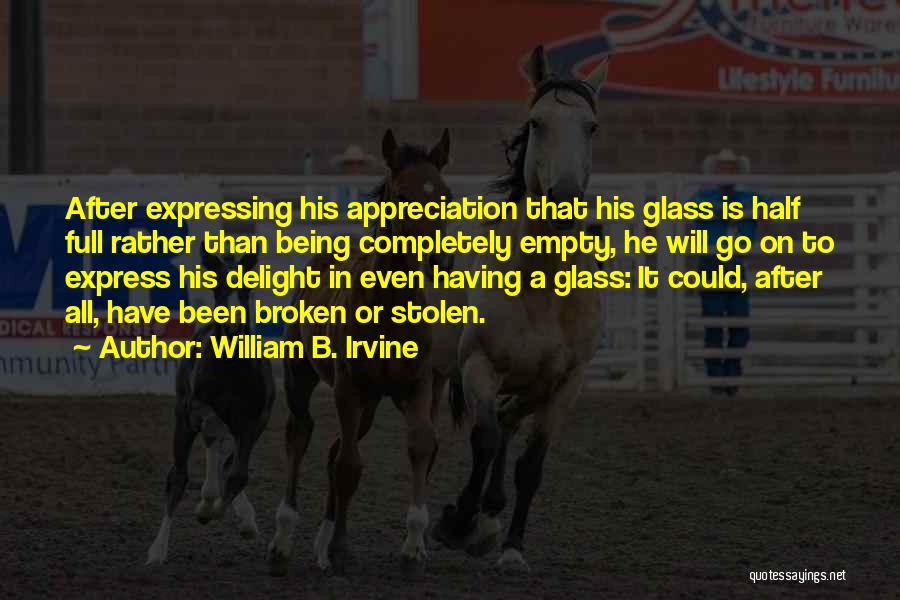
After expressing his appreciation that his glass is half full rather than being completely empty, he will go on to express his delight in even having a glass: It could, after all, have been broken or stolen. — William B. Irvine
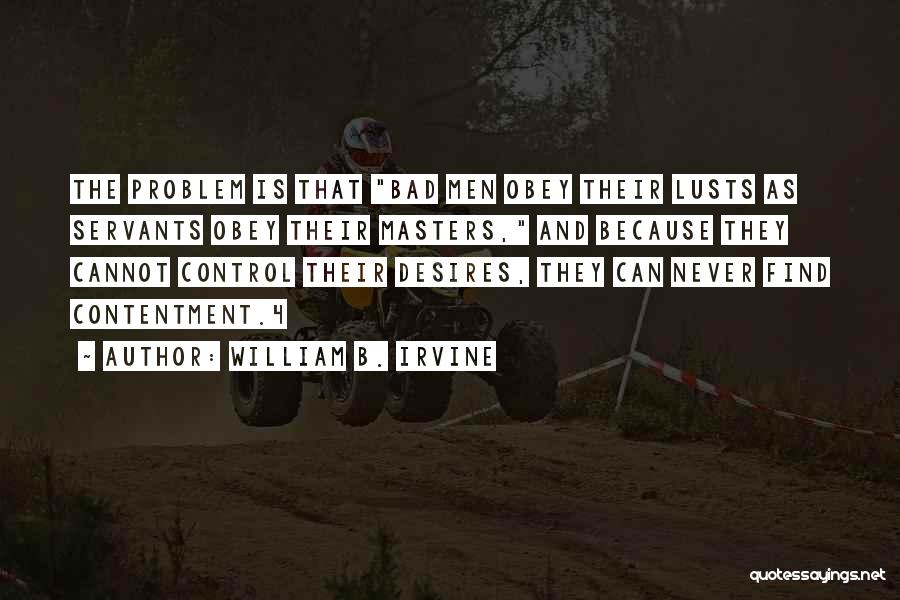
The problem is that "bad men obey their lusts as servants obey their masters," and because they cannot control their desires, they can never find contentment.4 — William B. Irvine
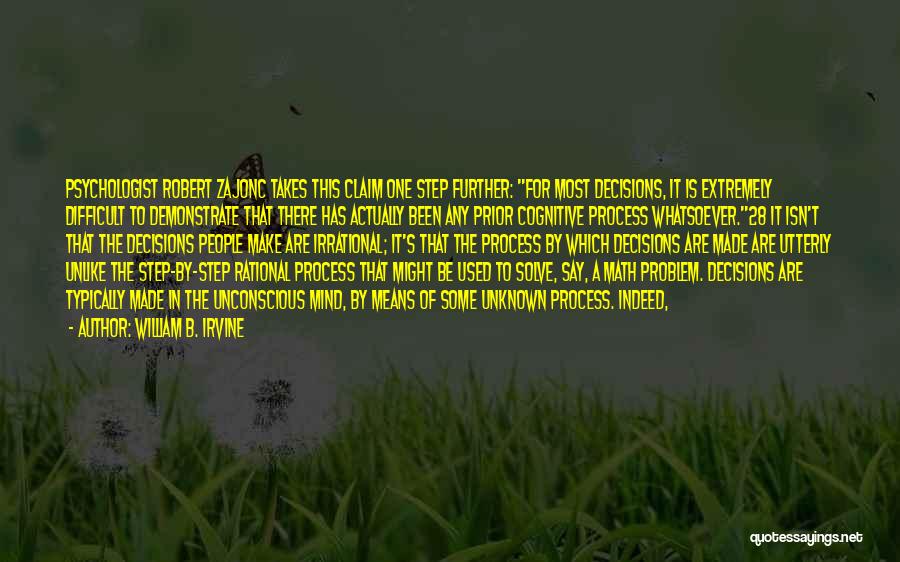
Psychologist Robert Zajonc takes this claim one step further: "For most decisions, it is extremely difficult to demonstrate that there has actually been any prior cognitive process whatsoever."28 It isn't that the decisions people make are irrational; it's that the process by which decisions are made are utterly unlike the step-by-step rational process that might be used to solve, say, a math problem. Decisions are typically made in the unconscious mind, by means of some unknown process. Indeed, — William B. Irvine
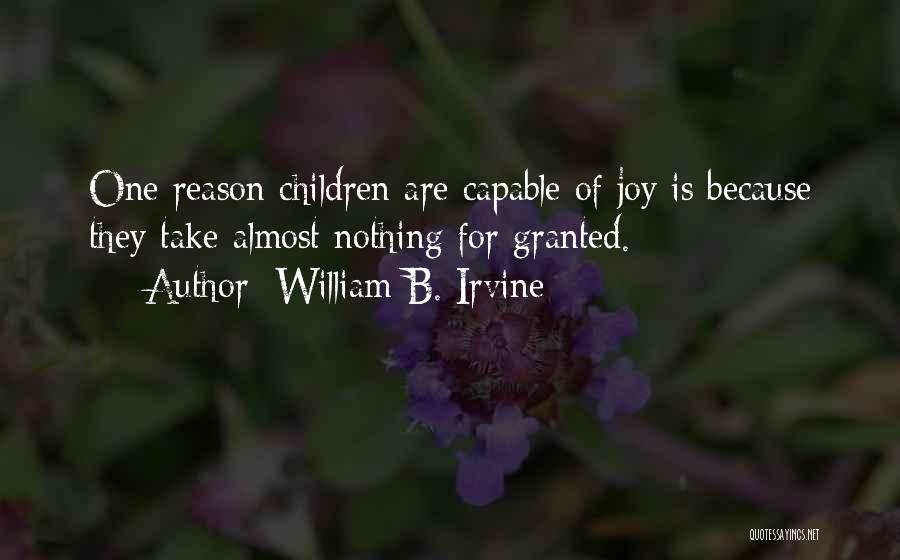
One reason children are capable of joy is because they take almost nothing for granted. — William B. Irvine
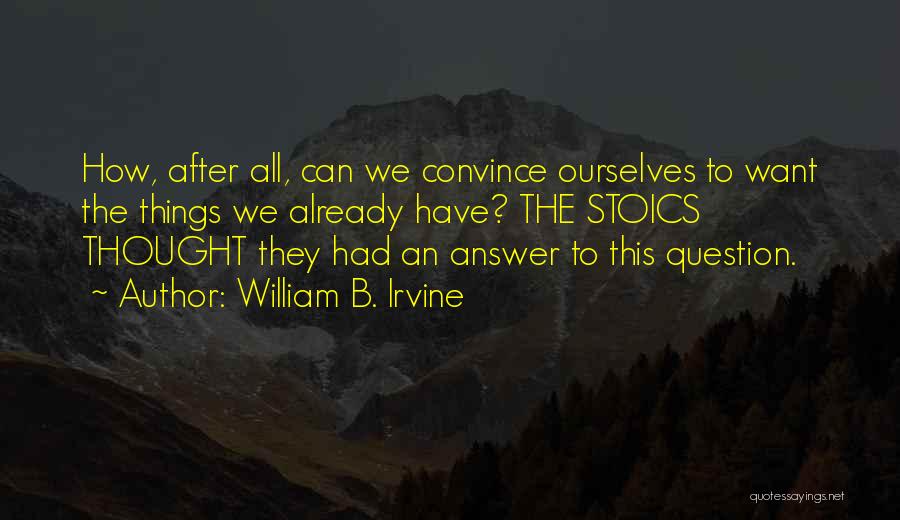
How, after all, can we convince ourselves to want the things we already have? THE STOICS THOUGHT they had an answer to this question. — William B. Irvine
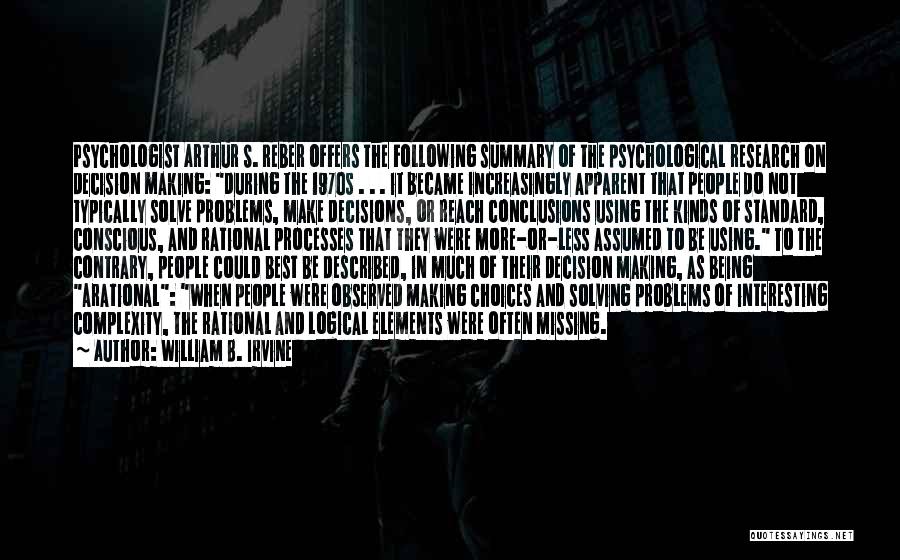
Psychologist Arthur S. Reber offers the following summary of the psychological research on decision making: "During the 1970s . . . it became increasingly apparent that people do not typically solve problems, make decisions, or reach conclusions using the kinds of standard, conscious, and rational processes that they were more-or-less assumed to be using." To the contrary, people could best be described, in much of their decision making, as being "arational": "When people were observed making choices and solving problems of interesting complexity, the rational and logical elements were often missing. — William B. Irvine
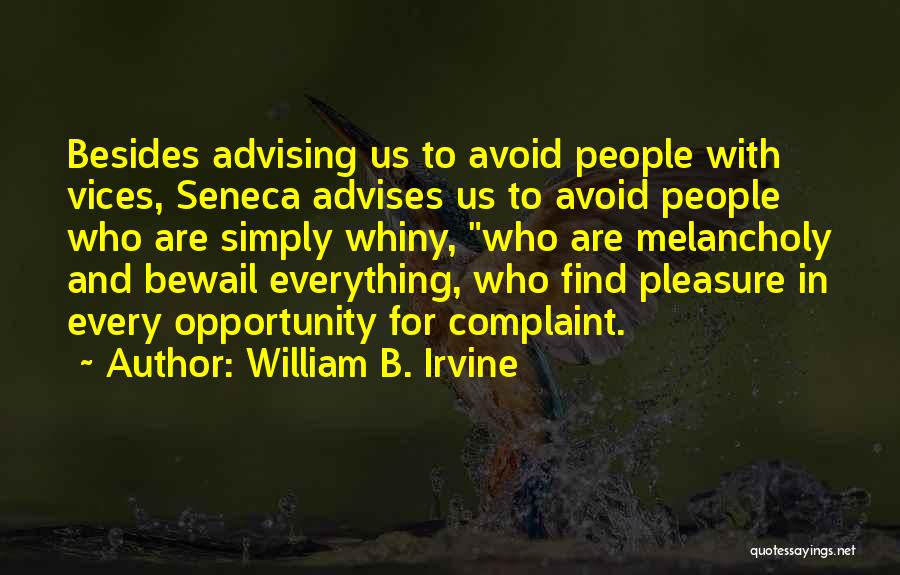
Besides advising us to avoid people with vices, Seneca advises us to avoid people who are simply whiny, "who are melancholy and bewail everything, who find pleasure in every opportunity for complaint. — William B. Irvine
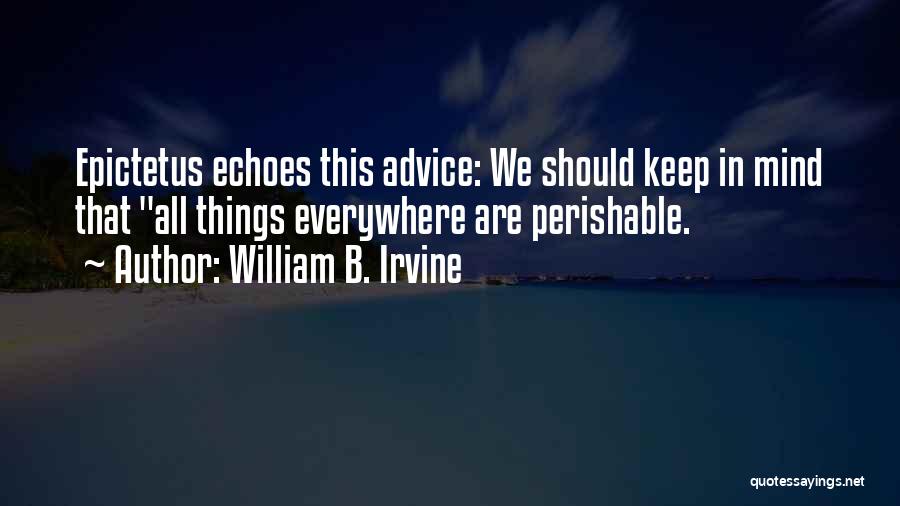
Epictetus echoes this advice: We should keep in mind that "all things everywhere are perishable. — William B. Irvine
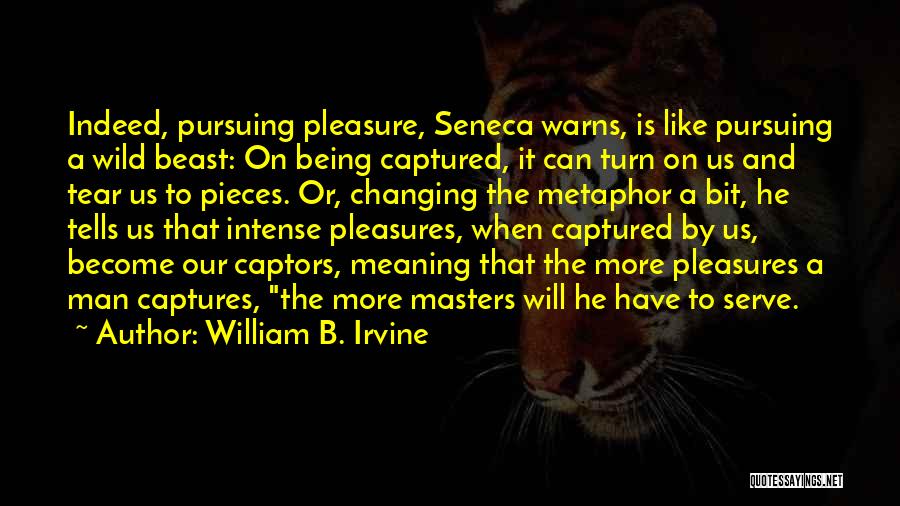
Indeed, pursuing pleasure, Seneca warns, is like pursuing a wild beast: On being captured, it can turn on us and tear us to pieces. Or, changing the metaphor a bit, he tells us that intense pleasures, when captured by us, become our captors, meaning that the more pleasures a man captures, "the more masters will he have to serve. — William B. Irvine
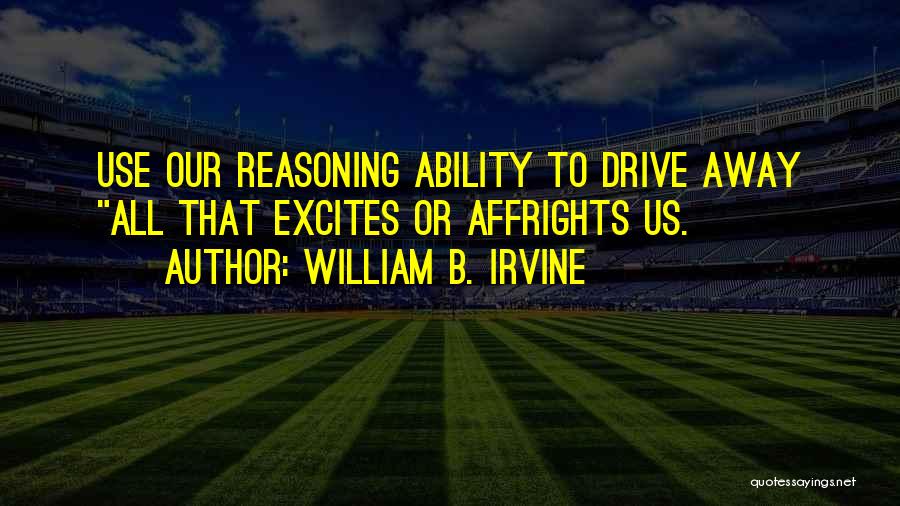
use our reasoning ability to drive away "all that excites or affrights us. — William B. Irvine







